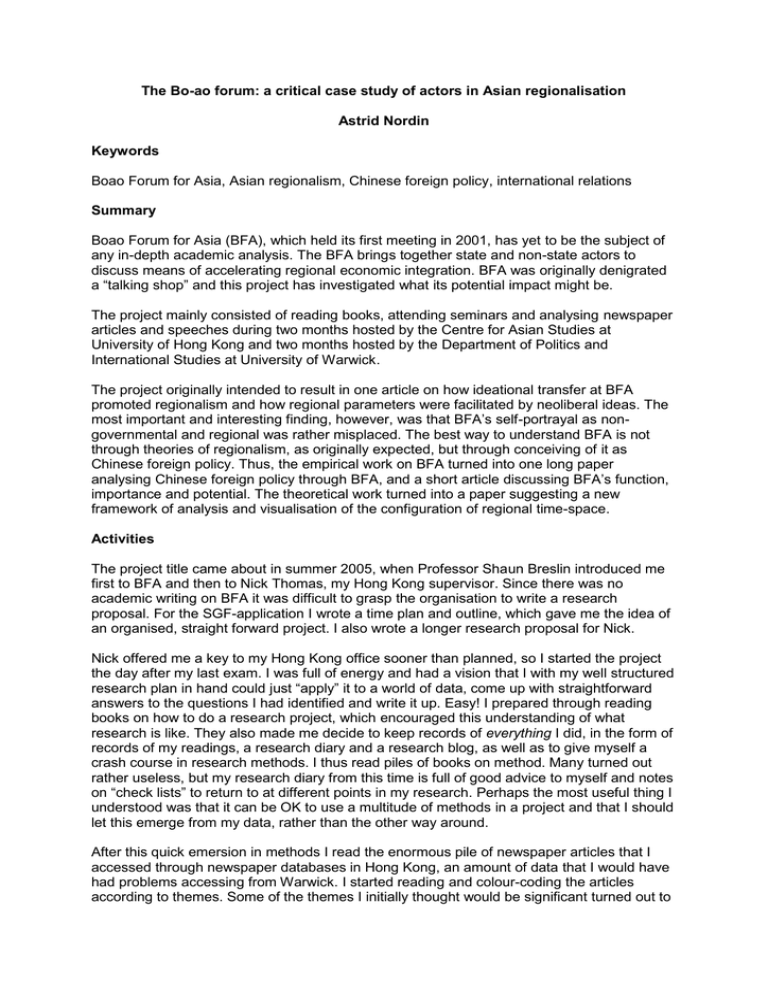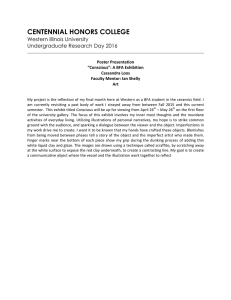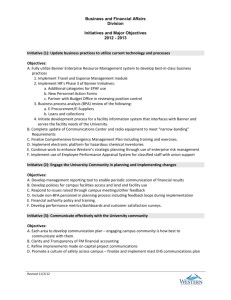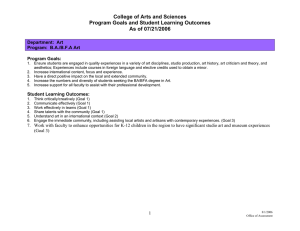The Bo-ao forum: a critical case study of actors in... Astrid Nordin Keywords Summary
advertisement

The Bo-ao forum: a critical case study of actors in Asian regionalisation Astrid Nordin Keywords Boao Forum for Asia, Asian regionalism, Chinese foreign policy, international relations Summary Boao Forum for Asia (BFA), which held its first meeting in 2001, has yet to be the subject of any in-depth academic analysis. The BFA brings together state and non-state actors to discuss means of accelerating regional economic integration. BFA was originally denigrated a “talking shop” and this project has investigated what its potential impact might be. The project mainly consisted of reading books, attending seminars and analysing newspaper articles and speeches during two months hosted by the Centre for Asian Studies at University of Hong Kong and two months hosted by the Department of Politics and International Studies at University of Warwick. The project originally intended to result in one article on how ideational transfer at BFA promoted regionalism and how regional parameters were facilitated by neoliberal ideas. The most important and interesting finding, however, was that BFA’s self-portrayal as nongovernmental and regional was rather misplaced. The best way to understand BFA is not through theories of regionalism, as originally expected, but through conceiving of it as Chinese foreign policy. Thus, the empirical work on BFA turned into one long paper analysing Chinese foreign policy through BFA, and a short article discussing BFA’s function, importance and potential. The theoretical work turned into a paper suggesting a new framework of analysis and visualisation of the configuration of regional time-space. Activities The project title came about in summer 2005, when Professor Shaun Breslin introduced me first to BFA and then to Nick Thomas, my Hong Kong supervisor. Since there was no academic writing on BFA it was difficult to grasp the organisation to write a research proposal. For the SGF-application I wrote a time plan and outline, which gave me the idea of an organised, straight forward project. I also wrote a longer research proposal for Nick. Nick offered me a key to my Hong Kong office sooner than planned, so I started the project the day after my last exam. I was full of energy and had a vision that I with my well structured research plan in hand could just “apply” it to a world of data, come up with straightforward answers to the questions I had identified and write it up. Easy! I prepared through reading books on how to do a research project, which encouraged this understanding of what research is like. They also made me decide to keep records of everything I did, in the form of records of my readings, a research diary and a research blog, as well as to give myself a crash course in research methods. I thus read piles of books on method. Many turned out rather useless, but my research diary from this time is full of good advice to myself and notes on “check lists” to return to at different points in my research. Perhaps the most useful thing I understood was that it can be OK to use a multitude of methods in a project and that I should let this emerge from my data, rather than the other way around. After this quick emersion in methods I read the enormous pile of newspaper articles that I accessed through newspaper databases in Hong Kong, an amount of data that I would have had problems accessing from Warwick. I started reading and colour-coding the articles according to themes. Some of the themes I initially thought would be significant turned out to be marginal, eg. environment, which meant I stopped coding those. Other themes emerged as I kept reading, eg. talk of globalisation as inevitable and other legitimising rhetoric. I also realised that much of the media reporting was on state actors, but I did not yet quite understand the impact this would have. Some themes, such as participation in BFA progressed much as I expected. I simultaneously kept reading on methods and decided not to pursue certain paths which I had thought might be interesting, eg. feminist IPE. After my first proper meeting with my supervisor (18.05.06) I decided to start writing summaries of meetings, outlining key actors, issues and motives. I soon realised that at the rate I worked, meticulously summarising and keeping a complete bibliography from the very start, my 2000 pages of articles would take a while to process. However, one of the most important things I learned from my research was that it really pays off to keep track of sources and I am very happy I did so from the very beginning. It took time and hard work to write this summary, which I never used as text for any article, but I believe the process helped me grasp what BFA was. This was difficult, but important, especially since many of my initial assumptions turned out faulty. Before this summarising exercise was finished, I created a structure for the paper, based on the themes I had teased out from my readings, visualised as a pyramid, read from bottom to top, in diagram 1 below. Conclusion Implications 1. Does BFA matter? 2. Spillover effect. Is BFA leading/coopting issues of other org.? 3. Is regionalism happening? Or is it just part of globalisation? Issues: 1. What type of regionalism? Does talk matter? 2. What is Asia? Countries or ideas? 3. Role of China? Narrative of BFA. Chronological, meetings-based history of BFA. What were the key issues? Why were they key (influential actors)? How were they discussed? What was the outcome? Outlining patterns, change in discourse. Theories/ constructions of regionalism. Literature review of theories/ approaches. Regions vs. clubs/networks. Diagram 1. First structure of BFA article I felt good about this structure, but was still unsure of what questions I was asking. Throughout my research I found it difficult to balance my own interests with my supervisors’ expectations, making the paper publishable and finding a suitable level of abstraction. A month after starting the project (14.06.06) I and Nick decided on a schedule for “filling in” the boxes in the pyramid, where I would write one section, discuss it with him and then rewrite. I learnt a lot in this period about the boundaries of my ability in terms of workload, style, etc. I often started writing just to produce something, but as I wrote the patterns I had seen started to make sense and new patterns came out of them. I had been reluctant to start writing, but as I took Nick’s advice and wrote anyway, new ideas emerged. I also read a large number of books on Asian politics and on theories of regionalism. I especially found useful a book on the configuration of globalization (Cameron and Palan, 2004) from which I built a theory applying those ideas to region and developing the model to pay (more) attention to non-hegemonic narratives (Diagram 2). Spatial trajectory Spatial form/ regional parameters Rival narrative 1 (R1) Rationalisation of causality Spatial form/ Regional parameters Retroscribed Spatial responses Hegemonic narrative (H) Different actors coping, resisting, managing, adapting, etc. Rationalisation of causality Rival narrative 2 (R2) Spatial form/ Regional parameters Proscribed Spatial trajectory ”Movement” of the story e.g. national to regional to global Rationalisation of causality e.g. economic determinism, nationalism, imperialism, etc. Spatial trajectory Diagram 2. (Re)producing spatial form/regional parameters I also developed the theory into a dynamic model through adding a second visualisation (Diagram 3). T0 T1 T2 R1 T3 R1 R1 R1 H R2 H H R2 R2 H R2 Diagram 3. Maintaining narrative hegemony I feared that Nick, who had been sceptical about my poststructuralist influences, would dismiss my model as too abstract, so I was positively surprised that I convinced him of the usefulness of my model. I started applying this model to BFA, reorganising the analysis according to this model. There were still gaps in my data, but I was now on my way to answering my initial questions. I had an idea of how the hegemonic narrative of regional core and parameters articulated through BFA hinged upon economic globalisation as a causal explanation for the region, and how this was linked to certain power-patterns. I also realised at this point that I was not going to have a “waterproof” case: I did not have access to state and business leaders who could have provided me with more evidence – but neither did anyone else. Due to media focus on state actors I also had lacking information on non-state actors. This taught me something about the nature of research, that it is impossible to be flawless. I returned to England (04.08.06) with a paper of over 20 000 words and still with a few gaps in terms of research. Nick had told me that I was now to start culling down the text. This, however, was not what my second supervisor, Shaun, had in mind. “Astrid”, he said, “you can’t continue with this idea. You have to stick either with the theory or with the empirical part”. This is how I learnt that changing supervisors in the middle of a project is a bad idea. I discussed the prospects of developing different parts of the paper and decided to shelve the theory and continue developing the more policy oriented research on BFA. However, I had at this point written rather extensively on the Chinese dominance of BFA, how the Chinese leadership through various decisions and for a number of different reasons/interests had “hijacked” BFA at an early stage, turning it away from the regional project it had started out as. I continued working on this new paper, reading more and more on Chinese foreign policy, when an unexpected possibility came along in the form of a journal article using a Foucauldian approach to regionalism. It was written by Brendan Donnegan and waiting for publication. I liked his style and saw the proximity of our research interests, so I contacted him, we had coffee and decided to develop the theoretical part of my first paper into a jointly written journal paper. Outcomes The project originally intended to result in one article on BFA as a regionalising institution thus spawned off in rather unexpected directions. The empirical work on BFA turned into one long paper analysing Chinese foreign policy through the BFA and a short article describing the function, importance and potential of BFA. The long paper considers how the interplay of different interests turned BFA into a Sino-centric organisation, which leads to a changing understanding of Chinese foreign policy as well as an assessment of the BFA’s potential impact on the region. I hope to submit this paper to a journal, but want to let it rest for a while, to return to it with “fresh eyes”. The theoretical work turned into a paper suggesting a new framework of analysis and visualisation of the configuration of regional time-space narrative. This paper is not finished, primarily because I am co-writing it with someone who has a less flexible schedule than I. We intend, however, to write this paper around Christmas. Presentations of the project has not yet taken place, since I want to let the finished paper rest and then revisit it before presenting to an audience. However, I have had contacts with several societies at Warwick who would like me to present my project to their members, including the “China in forecast” society. After revising the article I will also consider submitting it as a conference paper, but probably not within this scholar year. The project has contained continuous evaluation, by myself, my supervisors and others, primarily through weekly meetings, my blog and through my own re-reading of my research diary and evaluation of my project in light of check-lists I wrote in it at the beginning of the project. An outcome that deserves mentioning is also how my experience of undergraduate research as such has spread knowledge. The knowledge shared in Hong Kong necessarily focused more on promoting research based learning than on presenting findings. I organised two workshops and a panel discussion on undergraduate research based learning/creative learning styles at City University. Of course, doing this project has also had an effect on those who met me in the capacity of undergraduate researcher, contributing its little bit to creating a culture in academia where this is “the done thing”. This project has thus shown both academics and students that undergraduate research is feasible and beneficial and hopefully encouraged others, within at least three institutions of HE, to follow. The outcome that is by far the most important to me, however, is my own learning about what research can mean. I have realised that the fun part about research is not finding data to fit into a preconceived plan, but rather to find the unexpected. I think of it as though I have gotten closer to a research “habitus”. Due to this project I am now writing PhD proposals on the narrative configuration of regional time-space in Asia, with special focus on China.



